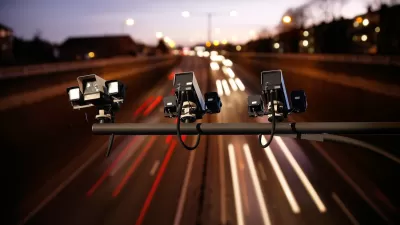For the second time in a year, Baltimore has pulled the plug on both its red-light and speed enforcement cameras, paying the contractor $600,000 to do so. Re-evaluation will determine where the city, which now owns most of the cameras, goes next.
"Termination of the (five-year) contract with Brekford Corp. puts the future of the city's speed and red-light camera system in question. One city councilwoman says it's time to stop using technology to nab speeders and red-light runners," write Scott Calvert and Yvonne Wenger of The Baltimore Sun.
Sources familiar with discussions between the city and Brekford said city officials had grown frustrated with the company's mistakes in trying to revive Baltimore's program, once North America's largest with more than 160 cameras. Speed cameras alone generated $50 million since 2009.
Tests by the city after the program went offline showed that, almost a year after Brekford took over in January, the system was still troubled by inaccurate speed readings, incorrect addresses and tickets listing wrong information on how to pay a citation, city officials have said.
Inaccuracies plagued the prior contractor as well. A Baltimore Sun investigation had revealed many glaring errors with Xerox State and Local Solutions, "including one that ticketed a driver for speeding while stopped at a red light."
Where the city goes from here will be determined after evaluation of the past program. Some on council still support using traffic enforcement technology. The termination agreement with Brekford will leave most of the cameras and associated technical network in city hands - for which the city had made "a previous payment to Brekford of $700,000 in August. The city has said that was partial payment for Brekford's purchase of 72 speed camera units, for which the city had agreed to pay $2.2 million," according to the Sun reporters.
Ending the five-year contract early will allow the city to "re-evaluate the scope" of its speed and red light camera program, change the way it compensates the vendor and "better execute the public safety mission of automated traffic enforcement," according to a memo from a city attorney describing the deal.
The $600,000 payment to Brekford was approved by the Baltimore City Board of Estimates [Agenda, PDF] on Wednesday, reported Fox 45 of Baltimore.
Nearby Washington D.C. has embraced the use of speed cameras for a variety of applications as we noted in September.
An extended version of this article can be found in The Baltimore Sun.
FULL STORY: Baltimore Will End Speed Camera Contract

Planetizen Federal Action Tracker
A weekly monitor of how Trump’s orders and actions are impacting planners and planning in America.

Maui's Vacation Rental Debate Turns Ugly
Verbal attacks, misinformation campaigns and fistfights plague a high-stakes debate to convert thousands of vacation rentals into long-term housing.

Restaurant Patios Were a Pandemic Win — Why Were They so Hard to Keep?
Social distancing requirements and changes in travel patterns prompted cities to pilot new uses for street and sidewalk space. Then it got complicated.

In California Battle of Housing vs. Environment, Housing Just Won
A new state law significantly limits the power of CEQA, an environmental review law that served as a powerful tool for blocking new development.

Boulder Eliminates Parking Minimums Citywide
Officials estimate the cost of building a single underground parking space at up to $100,000.

Orange County, Florida Adopts Largest US “Sprawl Repair” Code
The ‘Orange Code’ seeks to rectify decades of sprawl-inducing, car-oriented development.
Urban Design for Planners 1: Software Tools
This six-course series explores essential urban design concepts using open source software and equips planners with the tools they need to participate fully in the urban design process.
Planning for Universal Design
Learn the tools for implementing Universal Design in planning regulations.
Heyer Gruel & Associates PA
JM Goldson LLC
Custer County Colorado
City of Camden Redevelopment Agency
City of Astoria
Transportation Research & Education Center (TREC) at Portland State University
Jefferson Parish Government
Camden Redevelopment Agency
City of Claremont





























